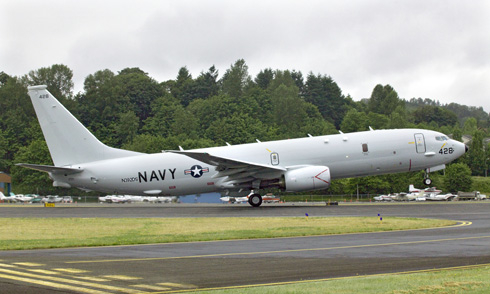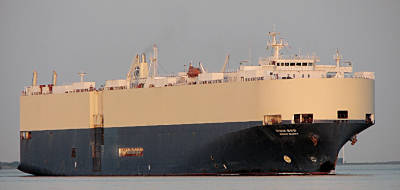The first Boeing [NYSE: BA] P‑8A Poseidon production aircraft completed its first flight on July 7, taking off from Renton Field and landing three hours later at Boeing Field in Seattle. The P‑8A is the first of six low-rate initial production (LRIP) aircraft Boeing is building for the U.S. Navy as part of a $1.6 billion contract awarded in January.
 |
| Boeing P‑8A Poseidon Production Aircraft Completes 1st Flight Foto: Boeing |
The first Boeing [NYSE: BA] P‑8A Poseidon production aircraft completed its first flight on July 7, taking off from Renton Field and landing three hours later at Boeing Field in Seattle. The P‑8A is the first of six low-rate initial production (LRIP) aircraft Boeing is building for the U.S. Navy as part of a $1.6 billion contract awarded in January.
The successful flight marked LRIP‑1’s completion of final assembly in the company’s Renton factory and transition to mission system installation and checkout in Seattle. Boeing will deliver LRIP‑1 to the Navy next year in preparation for initial operational capability, which is planned for 2013.
“This is the first P‑8 that will go directly to the fleet in Jacksonville, Fla., so the aircraft’s first flight is an important milestone for the Boeing team and our Navy customer,” said Chuck Dabundo, Boeing vice president and P‑8 program manager. “We’re on plan to get LRIP‑1 to the Navy in 2012.”
“As the Navy’s replacement for the P‑3 Orion, the P‑8A Poseidon represents the next generation of maritime patrol and reconnaissance aircraft,” said Capt. Michael Moran, program manager for Naval Air Systems Command’s Maritime Patrol and Reconnaissance Aircraft program office. “The fleet is actively preparing to receive the LRIP‑1 aircraft and begin the transition.”
The Navy plans to purchase 117 of the Boeing Next-Generation 737-based P‑8A anti-submarine warfare, anti-surface warfare, intelligence, surveillance and reconnaissance aircraft to replace its P‑3 fleet.
In order to efficiently design and build the P‑8A aircraft, the Boeing-led team is using a first-in-industry, in-line production process that draws on the company’s Next-Generation 737 production system. All aircraft modifications unique to the P‑8A are made in sequence during fabrication and assembly.
This is the first P‑8A to include a new CFM56-7BE engine configuration that is now standard on all delivered Next-Generation 737s. The configuration is an improved design that includes high- and low-pressure turbine modifications. Coupled with drag reduction improvements that Boeing started phasing into 737 production earlier this year, it will result in lower fuel consumption and maintenance cost savings.
Separate from the production contract, Boeing was awarded a System Development and Demonstration contract in 2004 to build and test six flight-test and two ground-test P‑8A aircraft. The first four flight-test planes are completing testing at Naval Air Station Patuxent River, Md. The program’s static test plane, S1, completed its test program earlier this year.
A derivative of the Next-Generation 737–800, the Poseidon is built by a Boeing-led industry team that includes CFM International, Northrop Grumman, Raytheon, Spirit AeroSystems, BAE Systems and GE Aviation.
A unit of The Boeing Company, Boeing Defense, Space & Security is one of the world’s largest defense, space and security businesses specializing in innovative and capabilities-driven customer solutions, and the world’s largest and most versatile manufacturer of military aircraft. Headquartered in St. Louis, Boeing Defense, Space & Security is a $32 billion business with 65,000 employees worldwide.
Contact:
Kimberlee Beers
Boeing Defense, Space & Security
425–478-1869
kimberlee.l.beers@boeing.com

 von
von 